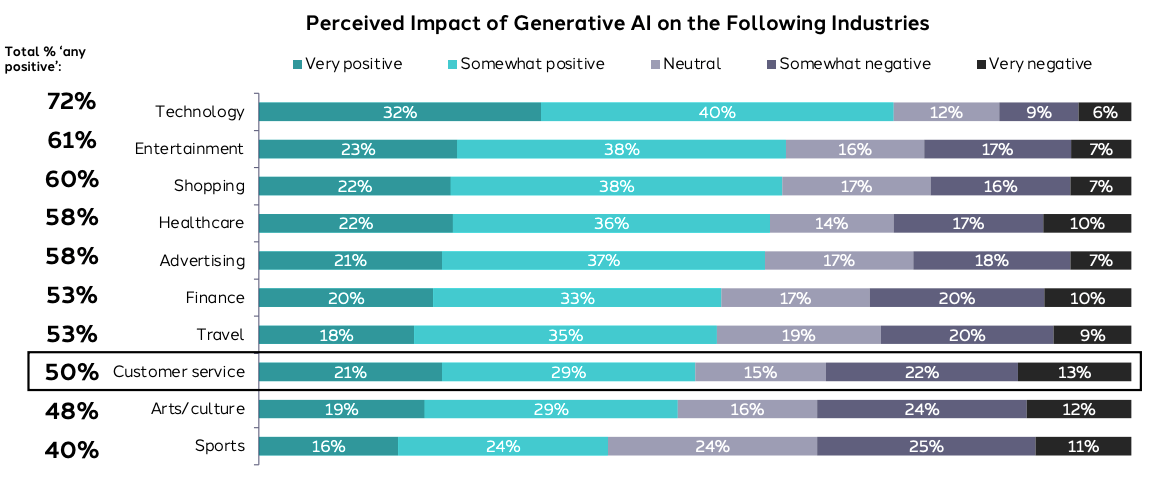Google Magi, AI Regulation, AI-Curious Consumers

'Panicked' Google Readies Magi
By now you've read or read coverage of the NY Times article yesterday that says Google is "panicking" over AI and its potential impact on the company's core business. In public, it's all measured confidence: "we've been headed this way all along." But OpenAI's launch, BingGPT and, more recently, surprise interest from Samsung in replacing Google search with Bing reportedly "shocked" the company. There are now 160 people at Google, says the Times, working on a search-AI integration called project Magi (Bargle), which will apparently be released next month. Arguably the article's bigger revelation is that Google intends to build a totally new, AI-search experience – eventually. The Magi-Bargle experience will be more "personalized" and "conversational" but will maintain ads (of course). The article also suggests Google is working on multiple other AI-supported products, including an image generator (which it has already), coding and language-learning tools. Magi-Bargle will initially be US-only and rolled out in phases.

Our take:
- Samsung is Google's biggest Android handset partner. The company is probably using a mix of carrots and sticks to keep that deal.
- The "personalization" element of Magi-Bargle could be problematic. Bard already suggests it's using search history to come up with answers.
- Google had been relatively complacent about search for years because there was little competition. Competition woke Google up.
AI Regulation Coming Soon
Google's CEO Sundar Pichai, appearing last night on "60 Minutes" as part of his post-Bard PR tour, invited AI regulation. He will get his wish, although the EU will get there first. The the European Data Protection Board has created an AI task force after Italy temporarily banned ChatGPT, subject to reinstatement conditions. They include transparency, privacy and consent. Those overlap with the Biden Admin's "AI Bill of Rights," (.pdf) released last year. The latter emphasizes fairness, accountability and transparency. Others have likened AI regulation to GAAP accounting principles, focused on shared (but enforceable) standards and disclosures. It's clear that regulation momentum is building, and the US, EU and China are moving forward. The US and EU appear to be focused on similar principles, while China is primarily concerned with AI not undermining state power. Early regulation carries risks, but self-regulation won't prevent undesirable outcomes (e.g., reinforcing inequality, undermining democracy), despite companies' stated values.

Our take:
- The US's proposed AI Bill of Rights is a good starting point. Some won't like potential restrictions on corporate discretion, however.
- Competition and efficiency will drive AI adoption into every corner of the global economy. But market values won't protect people.
- The US Commerce Department is accepting public comments on potential AI regulation and "AI accountability," through June 12, 2023.
Millennial Men Most AI Friendly
Another recent AI-related survey has come out, showing consumers both anticipating and fearful of an AI-driven future. The survey (n=1,000 US adults) was conducted by Dentsu in March. It found that 87% had heard of AI and 61% were somewhat familiar with it, though only 27% had used it in any form. ChatGPT and BingGPT were the most widely used applications. Among segments, Millennial men were the most interested, while 53% of Boomers were not at all. According to the survey, consumers trust "big tech" (44%) more than government (22%) to develop "responsible AI." Consumers are positive about some applications of AI and less so others (graphic below). People are most concerned about AI-related job loss, but they're generally supportive of companies using AI to design products, create ads and content or offer customer support. However, more than 70% of respondents want those brands to disclose when AI is involved in content creation or customer interactions. (As a gratuitous aside, teens still prefer phone (49%) to text (18%) for customer service interactions [Piper Sandler teen survey]).

Our take:
- It's still early for any solid conclusions about the public's appetite for AI-enhanced experiences, from this survey or others.
- If there is one major takeaway from the survey, it's that consumers are looking for transparency from companies using AI.
- They're also concerned about the human impact of AI on jobs, "social bonds," privacy and potential "unforseen effects."
Recent Analysis
- Near Memo ep. 109: Google’s Online Local Ads, Bard and local SEO, impact of chat on the future of local search.
Short Takes
- How to optimize For Google’s "selective link priority."
- Jack Dorsey's Twitter clone Bluesky gets a positive early review.
- Report: Blue accounts flooding Twitter with misinformation.
- Musk incorporates his OpenAI competitor: X.AI.
- AI will soon be composing music; who will own it (NYT)?
- Amazon makes its AI coding tool CodeWhisperer free.
- Amazon introducing Dash Carts to more Whole Foods stores.
- Some digital agencies losing "confidence" in Facebook results.
- GA national guard seeks to geofence high schools for recruiting.
- Russia winning the disinformation war with social. (WaPo).
- How to make ChatGPT consistently toxic (not that you should).
- Old iPhones helping Apple dominate US smartphone sales (WSJ).
Listen to our latest podcast.

How can we make this better? Email us with suggestions and recommendations.

